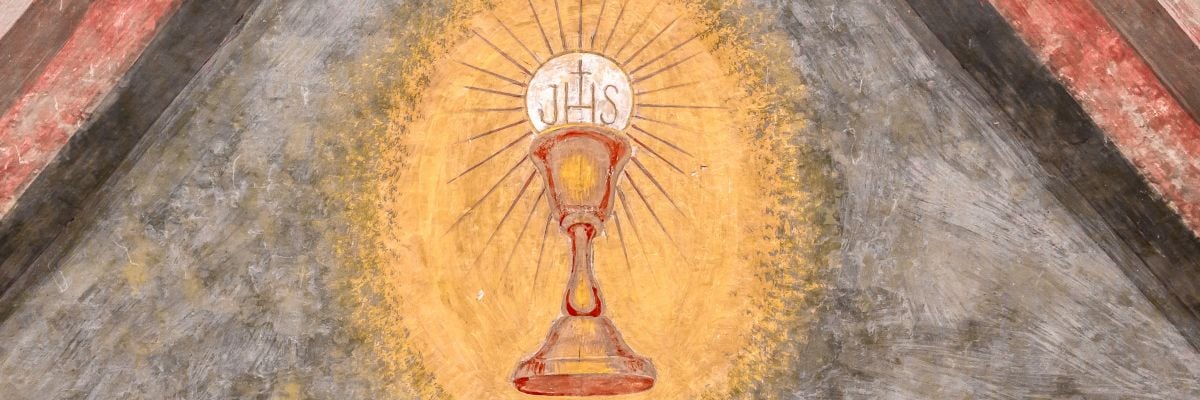
Tim Staples cites Scripture and early Church writings to refute the common Protestant claim that the Eucharist is only a symbol of Christ’s body.
Transcript:
Host: Let us go now to Paul in Michigan, watching on Facebook Live, you are up next, Paul. Your question for Tim.
Caller: Hi Tim, how you doing?
Tim: I’m doing great. How are you, Paul?
Caller: Yeah, I’ve got a question, speaking of the Word. Well, I was debating with some of my friends who are Protestant, and we were talking about Communion, and I was pointing out, you know, that Jesus said “This is my body,” “This is my blood,” you know. And we talked about “eating his flesh,” what’s the actual translation, and supposedly the word was “gnaw” on his flesh and drink his blood, and my friends said that Jesus wasn’t speaking….what’s the word I’m looking for….
Tim: He’s not speaking literally, but symbolically?
Caller: Yeah, he wasn’t trying to be literal, he was speaking symbolically. And he was saying that Jesus actually meant eating his word and not his flesh. And I’m like, “Well, wouldn’t it have been easier for Jesus to just say ‘Whoever eats of my word shall not perish, and has eternal life’?”
Host: It’s a fair question, Paul.
Tim: It is, and that’s a really good way to say it.
I will tell you this: that is exactly what I used to say when I was Protestant. And what happened to me was, my Catholic interlocutor, the famous Sergeant Matt Dula, he would often go back to “Well Tim, you know, we Catholics just believe Jesus’ word.” And that would bug me to no end! Because I would say, “But…ehhh…ughh…but he can’t really mean that!” And he’d say, “But you know, that’s what he says. That’s what he says, we simply believe.”
And then I’ll tell you something else that really helped me, Paul, was seeing that all Christians believed that, including St. Paul, who, as we mentioned earlier, in 1 Corinthians uses the plainest language available to say, you know, “The cup of blessing which we bless, is it not a partaking of the blood of Christ? And the bread which we break, is it not a partaking of the body of the Lord?”
And then 1 Corinthians 11:27-29, “If you eat the bread or drink the cup unworthily, you are guilty of the body and blood of the Lord.” I mean, this is plain language. “So let a man examine himself to see whether he’s in the faith,” right? “For if you eat the bread of the Lord or drink the cup unworthily, you eat and drink damnation to yourself, because you do not discern the body of the Lord.” The language Paul uses there is about as plain as day. He believed that it was really the body of the Lord. Notice he didn’t say: “Jesus actually meant ‘This represents my body.'” He said: “No, you don’t discern the body of the Lord.”
And then you find, from the very earliest Christian documents, we have St. Ignatius of Antioch, for example, in his famous letter to the Smyrnians, where he says, “The heretics–” he’s referring to some of the early Gnostics here–he said, “they abstain from the Eucharist and from prayer because they deny that the Eucharist is the flesh of our Lord and Savior Jesus Christ, the same flesh which suffered for our salvation.”
So the earliest Christians believed it as well. You have to go a long time into the future, our Protestant friends, to find folks–now, you had a few in the 11th and 12th centuries here and there, you know, you had your Berengarius, and some heresies, nominalist and such, that would deny the Real Presence–but very, very few up until the Reformation.
So why in the world–you might want to ask, Paul–“Why would I accept the word of you,” whoever your friend is, “why would I accept your word over St. Paul’s, over Ignatius of Antioch, and all Christians, basically for the first 1500 years of the Christian era? I’m sorry, I gotta go with Jesus, and Paul, and all the Christians.”
Host: And that will also drive them crazy when you say that, so it has that advantage as well.



